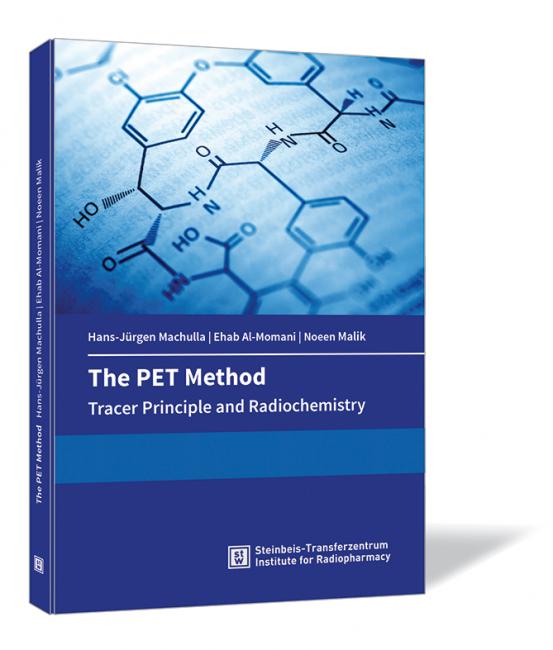Blick ins Buch | Cover als JPEG
In medicine beside CT and MRT, Positron Emission Tomography (PET) is one of the Molecular Imaging modalities. Yet, beyond imaging, PET exhibits the truly unique feature to assess metabolic processes ongoing within the organism by registration outside the body.
Typical PET radionuclides have short half-lives and, consequently, the compounds labeled in such a way (tracers) have a very low mass like 10 -6 g and even less as administered in a whole body dose. Therefore, those tracers allow to "trace" the biochemical processes of interest directly within the organism without alteration. As a general method, control of therapy is realized directly by PET measurement analyzing corresponding metabolic alterations and thus in case of lacking response therapeutic strategy can be changed. That holds for oncological and neuropsychiatric diseases. Even more, the possibility of a direct transfer from the in-vitro to the in-vivo level, i. e. the translation from the static to the dynamic biological system, is the key feature of the PET Method in drug development.
The book describes and explains applications of the PET Method (PET-CT, PET-MRT) in both research and clinical diagnostics to students and colleagues in the neighboring disciplines in science and medicine.
Die Publikation ist auch als E-Book erhältlich.
PhD Noeen Malik, PhD Master (MPhil) in chemistry was obtained at the University Faisalabad in Pakistan. At the University Tübingen, Germany, the PhD thesis was performed in Radiopharmacy on radio uorinations with emphasis on aromatic nucleophilic substitutions as well as development of potential PET tracers. As a Postdoc at the PET Center in Denver, USA, the radiopharmaceutical focus was on ligands for prostate tumors aiming at both diagnostic and therapeutic applications and thymidine kinase inhibitors. Thereafter as sr. researcher, R&D on radiopharmaceutical preparations and GMP productions was performed in the PET Center at the University Ulm, Germany. Since 2016, R&D work is carried out as Associate Researcher in Radiology at New York University Langone Medical Center in USA.
PhD Ehab Al-Momani, PhD Master (MSc) in chemistry and research assistant in organic chemistry at Hashemite University in Zarqa, Jordan. Teaching assistant and head of service laboratory for NMR and organic synthesis at University of Jordan in Amman, Jordan. At the University Tübingen, Germany, PhD thesis was performed in Radiopharmacy with focus on radioiodinations and, in particular, labeling with carbon-11 via cross-coupling reactions. As Postdoc in the PET-Center Ulm, Germany, developments and labeling of PSMA ligands with Zr-89, Ga-68 and F-18 for PET were carried out for imaging of prostate cancer. Since 2012, research associate in the PET Center at the University Hospital Würzburg for radiopharmaceutical development and GMP production aiming at applications both in diagnosis and radiotherapy.
PhD Hans-Jürgen Machulla, PhD Master (Dipl.Chem.) in chemistry and PhD thesis in the Research Center Jülich at the University Cologne, Germany, was carried out about stereochemical reactions by "hot" radiohalogens. As Postdoc in Brookhaven Natl. Laboratories on Long Island in New York, USA, the research work was on studies about reactions of "hot" 13N and 11C atoms. In Germany, thereafter, active participation in conceptional and organizational set-up of the PET Centers in Jülich, Essen, Bad Oeynhausen and Tübingen. At the Medical Faculty of the University Tübingen, the Professor position for Radiopharmacy was sponsored by the Volkswagen Foundation as the first Professor's Chair in Europe for development and application of radiopharmaceuticals. Additional funding by the state of Baden-Württemberg and the University Tübingen completed the PET Center with a building for cyclotron, radiochemistry labs and the PET scanner. R&D focused on radiosynthetic procedures, biological and clinical evaluation of radioactively labeled compounds as tracers in applying the Tracer Principle in international cooperation for which [18F]FLT is the striking example. Other typical activities were such as the recent ones e. g. member of the Commission for Radiopharmaceuticals of the Arzneibuch-Kommission at BfArM in Bonn and Chair of the Group Compounding and Radiopharmaceutical Preparation at Europ. Pharmacopoeia (EDQM), Council of Europe, in Strasbourg.
// As of: 11/2016

